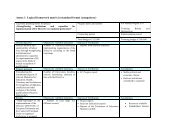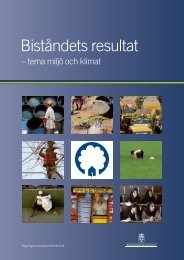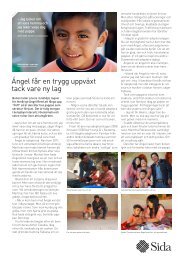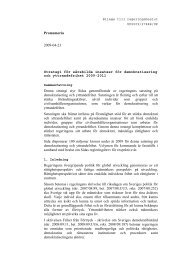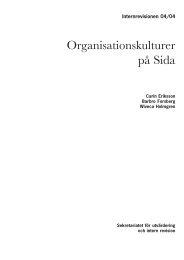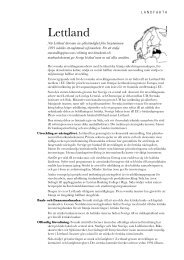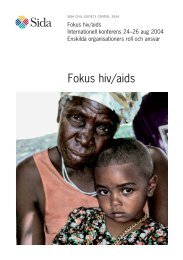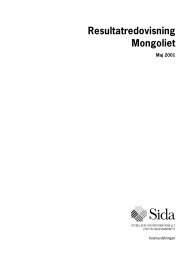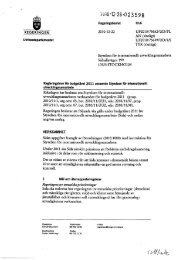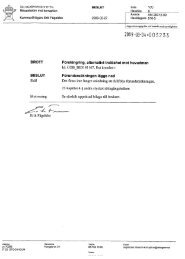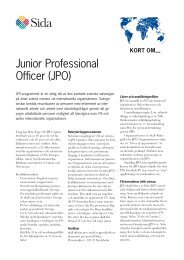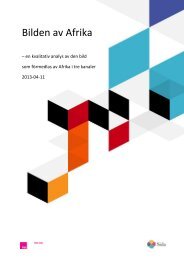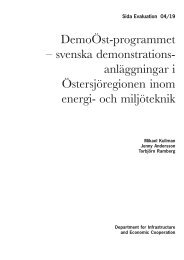Mid-Term Review of the AGIR Programme - Sida
Mid-Term Review of the AGIR Programme - Sida
Mid-Term Review of the AGIR Programme - Sida
You also want an ePaper? Increase the reach of your titles
YUMPU automatically turns print PDFs into web optimized ePapers that Google loves.
2 F I N D I N G S<br />
This observation was primarily centered on <strong>the</strong> belief that for <strong>AGIR</strong> to have a legacy<br />
in terms <strong>of</strong> good practices, it is important to clarify its contribution as a programme<br />
to a certain set <strong>of</strong> results, instead <strong>of</strong> linking <strong>the</strong>se results to specific intermediaries. 21<br />
The question has been raised if this is in fact critical – does <strong>the</strong>re need to be a distinction<br />
between <strong>the</strong> programme, intermediaries and CSOs in <strong>the</strong> determination <strong>of</strong> results<br />
and who gets credit? This is an important question and in terms <strong>of</strong> <strong>the</strong> end result, <strong>the</strong><br />
answer is perhaps not – civil society benefits from <strong>the</strong> result that has taken place. The<br />
point made by <strong>the</strong> external voice and with which this review agrees, is that for <strong>the</strong><br />
programme to be sustainable as a programme, it must be recognised for <strong>the</strong> results<br />
it has accomplished (as a programme).<br />
The 2011 <strong>AGIR</strong> semi-annual report states: “one <strong>of</strong> <strong>the</strong> greatest challenges <strong>of</strong> <strong>the</strong><br />
<strong>AGIR</strong> programme is <strong>the</strong> consolidation <strong>of</strong> <strong>the</strong> diverse programme partners view <strong>of</strong><br />
<strong>AGIR</strong> as a single programme in which each <strong>of</strong> <strong>the</strong>m makes his contribution” (Relatório<br />
Semi-Anual 2011, page 26). In a follow-up to this statement, <strong>the</strong> mid-term review<br />
team agrees with <strong>the</strong> conclusions <strong>of</strong> <strong>the</strong> 2012 semi-annual report that, while general<br />
reporting has improved, <strong>the</strong> programme needs to start analysing how <strong>the</strong> various outcomes<br />
<strong>of</strong> <strong>the</strong> <strong>the</strong>matic areas can be clustered and reported as a set <strong>of</strong> consistent programme<br />
results that clarify and streng<strong>the</strong>n <strong>the</strong> ability <strong>of</strong> <strong>AGIR</strong> to document and report<br />
on outcomes as a cohesive programme. A ‘spheres <strong>of</strong> influence model’ helps us to<br />
understand how <strong>AGIR</strong> has established <strong>the</strong>se ‘pathways <strong>of</strong> change’ through which<br />
funding and support flow out to partners, where change takes place at <strong>the</strong> organisational<br />
level <strong>of</strong> <strong>the</strong> CSO, and <strong>the</strong>n through <strong>the</strong>m, to <strong>the</strong> benefit <strong>of</strong> beneficiaries. This<br />
model can also help in demonstrating that <strong>the</strong> need for <strong>the</strong> programme to plan for,<br />
implement, monitor and report as a programme is critical to maintaining <strong>the</strong>se pathways<br />
as a cohesive approach and decreasing <strong>the</strong> threat <strong>of</strong> programme fragmentation<br />
and less effective implementation and reporting on results.<br />
Indeed, <strong>the</strong> programme has come a long way from its beginning, and has crossed<br />
many hurdles to improve coordination among intermediaries with different organisational<br />
cultures. Central to this coordination, is <strong>the</strong> Intermediaries Coordination Committee<br />
(ICC) and a technical team to support <strong>the</strong> coordination efforts undertaken to<br />
overcome <strong>the</strong> threat <strong>of</strong> fragmentation. The ICC is now consolidated as a steering body<br />
through which <strong>the</strong> intermediaries discuss programme cross-cutting issues, approaches<br />
to supporting CSO partners, <strong>the</strong> sharing <strong>of</strong> experiences and lessons learnt, and coordinating<br />
joint monitoring, reporting and outreach to <strong>the</strong> wider society. The number <strong>of</strong><br />
21 However recently, including in <strong>the</strong> last Consultative Forum, <strong>the</strong> <strong>AGIR</strong> programme’s visibility has improved,<br />
signaling a positive change in <strong>the</strong> right direction and <strong>of</strong> what it can achieve in terms <strong>of</strong> <strong>the</strong> dialogue<br />
between civil society and government.<br />
37



